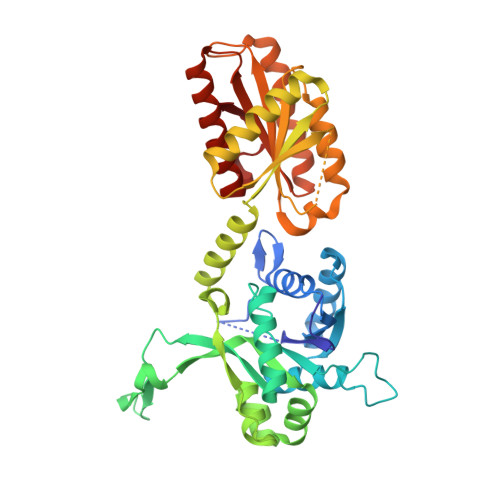Human Ispd is a Cytidyltransferase Required for Dystroglycan O-Mannosylation.
Riemersma, M., Froese, D.S., Van Tol, W., Engelke, U.F., Kopec, J., Van Scherpenzeel, M., Ashikov, A., Krojer, T., von Delft, F., Tessari, M., Buczkowska, A., Swiezewska, E., Jae, L.T., Brummelkamp, T.R., Manya, H., Endo, T., Van Bokhoven, H., Yue, W.W., Lefeber, D.J.(2015) Chem Biol 22: 1643
- PubMed: 26687144
- DOI: https://doi.org/10.1016/j.chembiol.2015.10.014
- Primary Citation of Related Structures:
4CVH - PubMed Abstract:
A unique, unsolved O-mannosyl glycan on α-dystroglycan is essential for its interaction with protein ligands in the extracellular matrix. Defective O-mannosylation leads to a group of muscular dystrophies, called dystroglycanopathies. Mutations in isoprenoid synthase domain containing (ISPD) represent the second most common cause of these disorders, however, its molecular function remains uncharacterized. The human ISPD (hISPD) crystal structure showed a canonical N-terminal cytidyltransferase domain linked to a C-terminal domain that is absent in cytidyltransferase homologs. Functional studies demonstrated cytosolic localization of hISPD, and cytidyltransferase activity toward pentose phosphates, including ribulose 5-phosphate, ribose 5-phosphate, and ribitol 5-phosphate. Identity of the CDP sugars was confirmed by liquid chromatography quadrupole time-of-flight mass spectrometry and two-dimensional nuclear magnetic resonance spectroscopy. Our combined results indicate that hISPD is a cytidyltransferase, suggesting the presence of a novel human nucleotide sugar essential for functional α-dystroglycan O-mannosylation in muscle and brain. Thereby, ISPD deficiency can be added to the growing list of tertiary dystroglycanopathies.
- Department of Neurology, Donders Institute for Brain, Cognition and Behavior, Radboud University Medical Center, 6525 GA Nijmegen, the Netherlands; Translational Metabolic Laboratory, Department of Laboratory Medicine, Radboud Institute for Molecular Life Sciences, Radboud University Medical Center, 6525 GA Nijmegen, the Netherlands; Department of Human Genetics, Donders Institute for Brain, Cognition and Behavior, Radboud University Medical Center, 6525 GA Nijmegen, the Netherlands.
Organizational Affiliation:



















